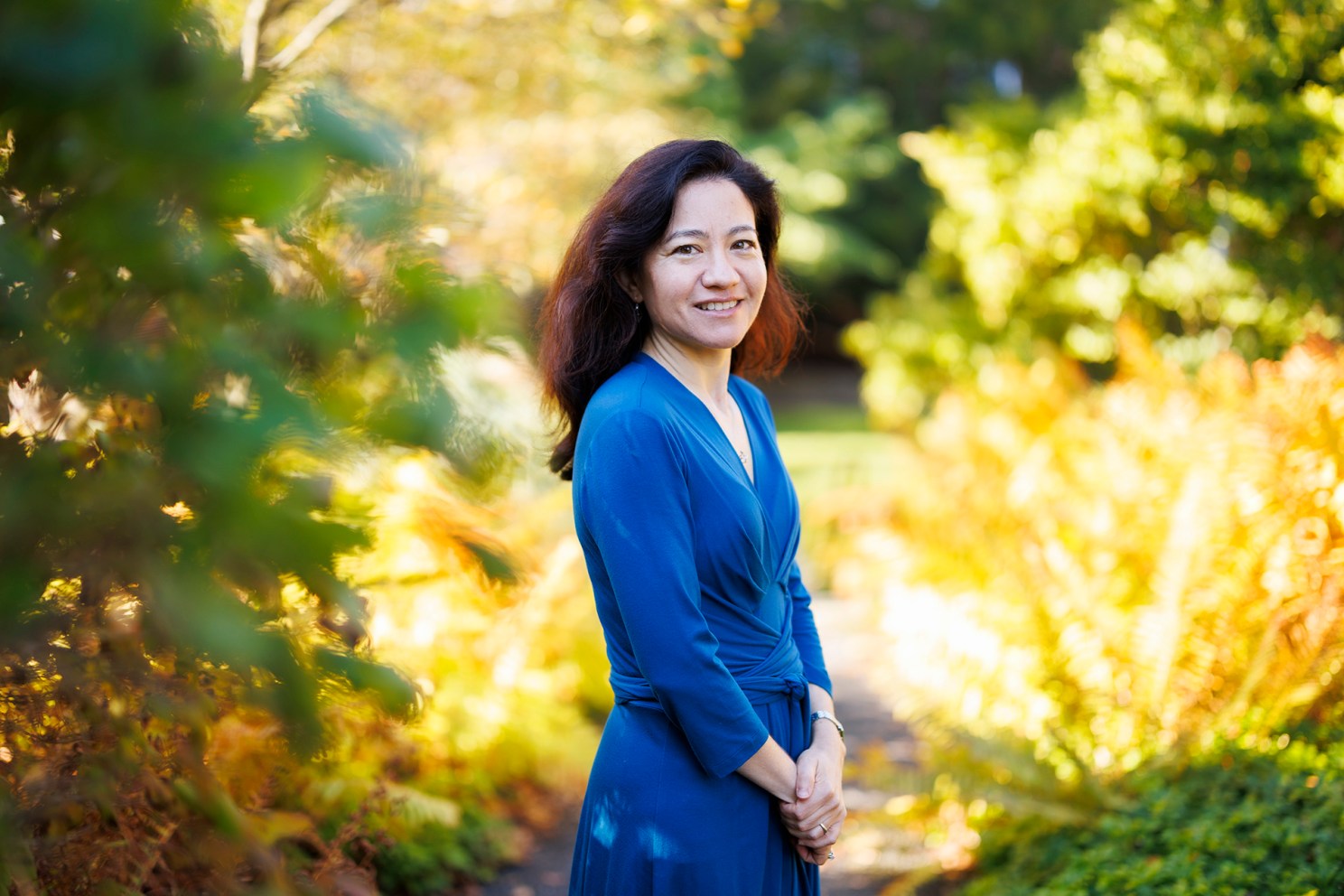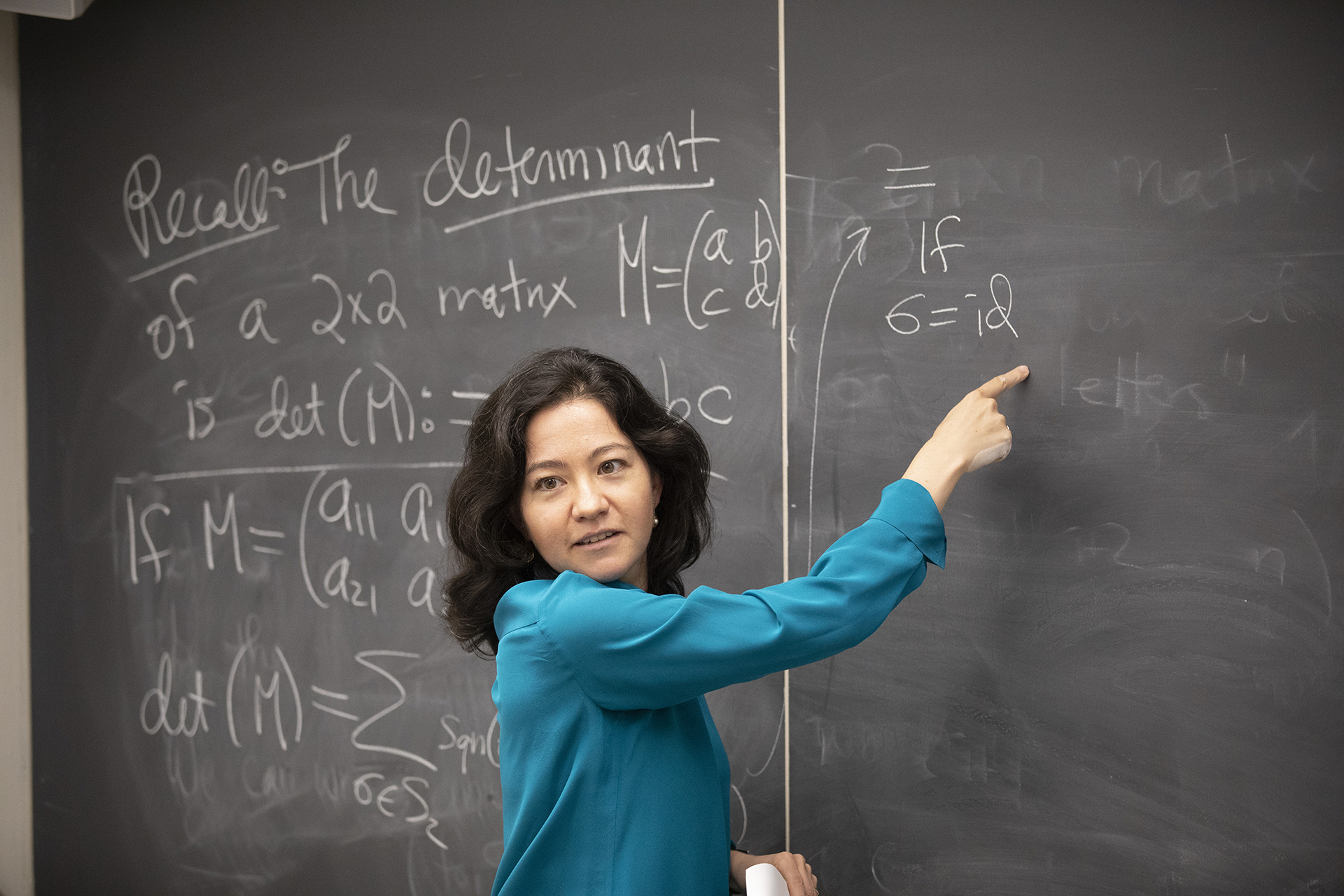Lauren Williams awarded MacArthur ‘genius grant’
Lauren Williams awarded MacArthur ‘genius grant’

Math professor honored for theoretical breakthroughs with sometimes surprising applications across phenomena such as tsunamis, traffic
Lauren Williams ’00 is a theoretical mathematician and recently she felt stuck in her research, a recurring frustration for a scholar who wrestles with difficult conceptual problems.
Then, as Williams worked quietly in her home office, she was jolted by an unexpected revelation: The MacArthur Foundation phoned to inform Williams that she had won a celebrated “genius grant” — a “no-strings-attached” fellowship that provides recipients $800,000 over five years.
“I was completely shocked,” recalled Williams, Dwight Parker Robinson Professor of Mathematics. “I was just sort of trying to verify for myself that I was awake, and this was real.”
Williams was one of 22 fellows announced Wednesday. The MacArthur Foundation credited Williams for “elucidating unexpected connections” between her field of algebraic combinatorics and other areas in math and physics.
The foundation said: “With a curiosity-driven approach to research and willingness to collaborate across disciplines, Williams is expanding fundamental mathematical theory and building fruitful connections between mathematics and other scientific fields.”

Williams specializes in algebra and combinatorics and how they can be applied to problems in math and physics. Simply put, combinatorics is the study of discrete, finite things that can be counted as opposed to things that are continuous — think the continuous surface of the ocean vs. the waves.
Much of her work involves the “positive Grassmannian,” a geometric shape whose points represent simpler geometric objects.
Other scholars have discovered that her theoretical work applies to a diverse array of phenomena such as shallow water waves, tsunamis, collisions of fundamental particles, protein synthesis, and the flow of traffic on one-way streets.
Williams remains both fascinated and perplexed about why the positive Grassmannian keeps popping up in such disparate domains. “It’s one of the biggest mysteries that I’ve encountered,” she said.
Williams draws inspiration from a quotation from British mathematician G.H. Hardy: “The mathematician’s patterns, like the painter’s or the poet’s must be beautiful; the ideas like the colours or the words, must fit together in a harmonious way. Beauty is the first test: There is no permanent place in the world for ugly mathematics.”
“If you ask a question and the answer is not beautiful, that means you asked the wrong question.”
At an aesthetic level, Williams sees many parallels between her work in pure math and the arts: all solve puzzles within the rules of the medium; all involve patterns, beauty, and harmony.
“If you ask a question and the answer is not beautiful, that means you asked the wrong question,” she said.
Raised in the suburbs of Los Angeles, Williams grew up as a voracious reader, aspiring writer, and violinist. In fourth grade, she discovered she was good at math when she won her school district competition, and she continued pursuing her interest in summer programs and math competitions.
As a Harvard undergraduate, she majored in mathematics at a time when there were no women on the department faculty.
After earning her Ph.D. at MIT, she returned to Harvard on a Benjamin Peirce postdoctoral fellowship. She spent nine years on the faculty at the University of California at Berkeley before returning to Harvard in 2018 as only the second female tenured professor in the history of the Math Department.
With the MacArthur grant turning a spotlight on her corner of academia, Williams hopes to inspire other young women who aspire to careers in mathematics.
“When I was a student, I worried quite a lot about whether I could get an academic job and whether a career in academia was compatible with having children,” said Williams, now a mother of two. “To the students who are interested in a career in math academia but are worried about the same issues, I would very much encourage them to go for it.”
Her career has been a balancing act — sometimes quite literally. As a young professor, Williams had an infant who was a fitful sleeper and night after night, she and her husband took turns rocking the child to sleep by bobbing on a yoga ball.
“If you’re holding a baby in a dark room, gently bouncing, there’s nothing you can do except think,” said Williams. “One night, I started thinking about a question and that actually led to my next paper.”
Today Williams is one of three women on the Harvard math faculty. This small cohort is racking up an impressive record with MacArthur Fellowships: Melanie Matchett Wood was named a MacArthur Fellow in 2022.
(Also among this year’s MacArthur cohort was Hahrie Han ’97, a political science professor at Johns Hopkins University who was recognized for her research into how people engage in civil and political affairs.)
For Williams, the award comes at an opportune moment. She had three federal research grants terminated in May — including one for a conference scheduled for the following month, forcing her and her colleagues to scramble to reorganize the event.
“This award really couldn’t come at a better time, personally,” she said.
At a larger level, the recognition is about more than one scholar. Like her beloved positive Grassmannian, her achievement reflects those of many others.
“I’m shocked and honored, but also just incredibly grateful to the dozens, if not hundreds, of amazing teachers, mentors, collaborators, friends, and family members who have supported me,” said Williams. “The biggest overwhelming reaction for me is really just gratitude.”
Williams is also the 2024-2025 Sally Starling Seaver Professor at Harvard Radcliffe Institute.
Latest Harvard
- Time for mandatory retirement ages for lawmakers, judges, presidents?Americans seem to mostly say yes; legal, medical scholars point to complexities of setting limits
- In dogs, as in humans, a harsh past might bare its teethEarly adversity leads to higher aggression and fearfulness in adult canines, study says
- Brief bursts of wisdomAphorism lover and historian James Geary reflects on how ancient literary art form fits into age of social media
- Flew home as Will Flintoft, returned as Rhodes ScholarApplied math concentrator to study computer science, theology with eye toward AI
- What will AI mean for humanity?Scholars from range of disciplines see red flags, possibilities ahead
- Tai Tsun Wu, 90Memorial Minute — Faculty of Arts and Sciences






